|
De Welshe schrijver Cynan Jones werd geboren op 27 februari 1975 in Aberystwyth, Wales. Zie ook alle tags voor Cynan Jones op dit blog.
Uit: The Dig
“The policeman opened the door, looked at the deep mud of the yard, and got deliberately out.
Set back from the window, the man watched him through the gap in the curtains. He watched him scan the place. The policeman was young and he was not a policeman the big man had seen before.
The policeman bent through the car door and pushed the horn twice.
What do I do here? thought the man. He wished he’d left one of the big dogs off but knew even through the coal it would scent the badger and bother it. If I stay in the house, he’ll start looking round, thought the man. Ag.
The policeman had started to walk toward the house from the car and the big man came out.
Afternoon, sir. It’s clearing up, the policeman said. The policeman looked at the man and looked out as if at the weather over the valley.
The big man just nodded.
Few questions, really, sir. The policeman was light and inoffensive the way they are and the man moved to bring him away from the house.
Can you tell me what you were doing last night, or early this morning?
The big man didn’t reply.
The policeman looked around at the yard and privately noticed the two sets of tire tracks that were cut into the mud and that were not filled with overnight rain. He saw the old red van and guessed one set belonged to that. The policeman took in the many dumped engines and tires and the wastage of vehicles and machines about.
We’ve had a report of fly-tipping. He waited. I just wanted to ask whether you would know anything about that.
What did they tip? asked the man.
The policeman didn’t respond. He was looking at the junk and the big man saw and said, Does it look like I throw things away?”
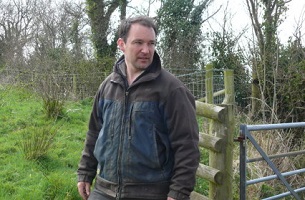
Cynan Jones (Aberystwyth, 27 februari 1975)
De Amerikaanse schrijver John Steinbeck werd geboren in Salinas, Californië, op 27 februari 1902. Zie ook alle tags voor John Steinbeck op dit blog.
Uit: Travels with Charley
“Then I found a telescope sight I had to have, and waited while it was mounted on the rifle, and in the process got to know everyone in the shop and any customers who entered. With the gun in a vise and the bolt out, we zeroed the new sight on a chimney three blocks away, and later when I got to shooting the little gun I found no reason to change it. I spent a good part of a morning at this, mostly because I wanted to stay. But I see that, as usual, love is inarticulate. Montana has a spell on me. It is grandeur and warmth. If Montana had a seacoast, or if I could live away from the sea, I would instantly move there and petition for admission. Of all the states it is my favorite and my love.
At Custer we made a side trip south to pay our respects to General Custer and Sitting Bull on the battlefield of Little Big Horn. I don’t suppose there is an American who doesn’t carry Remington’s painting of the last defense of the center column of the 7th Cavalry in his head. I removed my hat in memory of brave men, and Charley saluted in his own manner but I thought with great respect.
The whole of eastern Montana and the western Dakotas is memory-marked as Injun country, and the memories are not very old either. Some years ago my neighbor was Charles Erskine Scott Wood, who wrote Heavenly Discourse. He was a very old man when I knew him, but as a young lieutenant just out of military academy he had been assigned to General Miles and he served in the Chief Joseph campaign. His memory of it was very clear and very sad. He said it was one of the most gallant retreats in all history. Chief Joseph and the Nez Percés with squaws and children, dogs, and all their possessions, retreated under heavy fire for over a thousand miles, trying to escape to Canada. Wood said they fought every step of the way against odds until finally they were surrounded by the cavalry under General Miles and the large part of them wiped out. It was the saddest duty he had ever performed, Wood said, and he had never lost his respect for the fighting qualities of the Nez Percés. “If they hadn’t had their families with them we could never have caught them,” he said. “And if we had been evenly matched in men and weapons, we couldn’t have beaten them. They were men,” he said, “Real men.”

John Steinbeck (27 februari 1902 - 20 december 1968)
Cover
De Britse dichter en schrijver Lawrence George Durrell werd geboren op 27 februari 1912 in Jalandhar in India. Zie ook alle tags voor Lawrence Durrell op dit blog.
Uit: The Alexandria Quartet
“It was cold in the street and I crossed to the lighted blaze of shops in Rue Fuad. In a grocer’s window I saw a small tin of olives with the name Orvieto on it, and overcome by a sudden longing to be on the right side of the Mediterranean, entered the shop: bought it: had it opened there and then: and sitting down at a marble table in that gruesome light I began to eat Italy, its dark scorched flesh, hand-modelled spring soil, dedicated vines. I felt that Melissa would never understand this. I should have to pretend I had lost the money. I did not see at first the great car which she had abandoned in the street with its engine running. She came into the shop with swift and resolute suddenness and said, with the air of authority that Lesbians, or women with money, assume with the obviously indigent: ‘What did you mean by your remark about the antinomian nature of irony?’ — or some such sally which I have forgotten.”
(…)
“Idle’ she writes ‘to imagine falling in love as a correspondence of minds, of thoughts; it is a simultaneous firing of two spirits engaged in the autonomous act of growing up. And the sensation is of something having noiselessly exploded inside each of them. Around this event, dazed and preoccupied, the lover moves examining his or her own experience; her gratitude alone, stretching away towards a mistaken donor, creates the illusion that she communicates with her fellow, but this is false. The loved object is simply one that has shared an experience at the same moment of time, narcissistically; and the desire to be near the beloved object is at first not due to the idea of possessing it, but simply to let the two experiences compare themselves, like reflections in different mirrors. All this may precede the first look, kiss, or touch; precede ambition, pride or envy; precede the first declarations which mark the turning point — for from here love degenerates into habit, possession, and back to loneliness.”
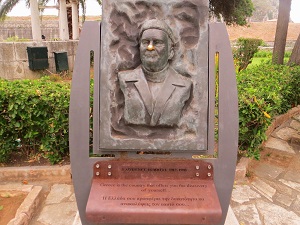
Lawrence Durrell (27 februari 1912 – 7 november 1990)
Standbeeld in Corfu-stad
De Canadese dichter, schrijver en essayist André Roy werd geboren op 27 februari 1944 in Montréal. Zie ook alle tags van André Roy op dit blog.
C’est la nuit où nous sommes
C’est la nuit où nous sommes
toi, moi, nous, les autres pareils à nous.
Encore l’action,
la structure de la pensée dans l’action.
Monde moderne des forêts et des eaux.
Tu appartiens aux forains,
à nos ancêtres les vampires.
Les villes, les maisons, les lits
où nous avons pensé être
mystérieux, impossibles, immortels,
quelle folie !
Le désir coule;
nous pourrions nous tuer
pour la connaissance du désir.
Actions, roues, horloges
Actions, roues, horloges.
Les images où nous nous imaginons
grands, désirés, symboliques
varient avec le temps.
Une histoire succède à notre histoire,
nos corps produisent des contre-corps.
La lumière fond sur la toile,
blancheur qui coule,
ça devient action.
Le corps se refait au cinéma,
il y vit, il y meurt, il y ressuscite;
il est l’autre que moi je suis,
de ce que je connaîtrai dans la peur.

André Roy (Montréal, 27 februari 1944)
De Amerikaanse dichter Henry Wadsworth Longfellow werd geboren in Portland, Maine, op 27 februari 1807. Zie ook alle tags voor Henry Longfellow op dit blog.
The Village Blacksmith
Under a spreading chestnut-tree
The village smithy stands;
The smith, a mighty man is he,
With large and sinewy hands;
And the muscles of his brawny arms
Are strong as iron bands.
His hair is crisp, and black, and long,
His face is like the tan;
His brow is wet with honest sweat,
He earns whate'er he can,
And looks the whole world in the face,
For he owes not any man.
Week in, week out, from morn till night,
You can hear his bellows blow;
You can hear him swing his heavy sledge,
With measured beat and slow,
Like a sexton ringing the village bell,
When the evening sun is low.
And children coming home from school
Look in at the open door;
They love to see the flaming forge,
And hear the bellows roar,
And catch the burning sparks that fly
Like chaff from a threshing-floor.
He goes on Sunday to the church,
And sits among his boys;
He hears the parson pray and preach,
He hears his daughter's voice,
Singing in the village choir,
And it makes his heart rejoice.
It sounds to him like her mother's voice,
Singing in Paradise!
He needs must think of her once more,
How in the grave she lies;
And with his hard, rough hand he wipes
A tear out of his eyes.
Toiling,--rejoicing,--sorrowing,
Onward through life he goes;
Each morning sees some task begin,
Each evening sees it close
Something attempted, something done,
Has earned a night's repose.
Thanks, thanks to thee, my worthy friend,
For the lesson thou hast taught!
Thus at the flaming forge of life
Our fortunes must be wrought;
Thus on its sounding anvil shaped
Each burning deed and thought.
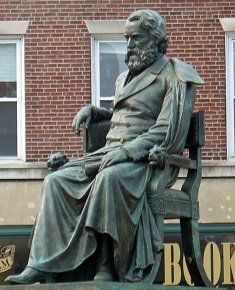
Henry Longfellow (27 februari 1807 - 24 maart 1882)
Standbeeld in Portland
De Duitse schrijfster en dichteres Elisabeth Borchers werd geboren in Homberg op 27 februari 1926. . Zie ook alle tags voor Elisabeth Borchers op dit blog.
Hast du gesehen
hast du den vogel gesehen
der dies und das tat ich sah ihn
hast du den fisch gesehen
mit dem vielen und wenigen ich sah ihn
hast du das pferd gesehen
mit dem neben und fernen ich sah es
der vage] glühte im meer
der fisch bewanderte das Land
das pferd zog den himmel ab
sage nicht der morgen ist. rot
sage nicht laut wir bereisen
die nacht
Regen
einmal geschah es
da trank ich die ewigkeit aus
und den regen
ein andermsl geschah es
da ertrank der regen
in meiner ewigkeit
doch dann geschah es
daß es regnete
die stimme des regens
meines regens kleine stimme
wie kann das sein?
wird morgen das gras grün sein?
morgen wird das gras grün sein
und sonst wird nichts sein?
sonst nichts

Elisabeth Borchers (27 februari 1926 – 25 september 2013)
Cover
De Amerikaanse schrijver James Thomas Farrell werd geboren op 27 februari 1904 in Chicago. Zie ook alle tags voor James T. Farrell op dit blog.
Uit: Young Lonigan
“He had walked home with her. All along Indiana Avenue, he had been liking her, wanting to kiss her. Now, he remembered that day as clearly as if it had just happened. He remembered it better than the day when he was just a punk and he had bashed the living moses out of that smoke who pulled a razor on him over in Carter Playground, and a gang of guys had carried him around on their shoulders, telling him what a great guy he was, and how, when he grew up, he would become the white hope of the world, and lick Jack Johnson for the heavyweight championship. He remembered the day with Lucy, and his memory of it was like having an awful thirst for a drink of clear cold water or a chocolate soda on a hot day. It had been a windy day in March, without any sun. The air had seemed black, and the sky blacker, and all the sun that day had been in his thoughts of her. He had had all kinds of goofy, dizzy feelings that he liked. They had walked home from school, along Indiana Avenue, he and Lucy. They hadn’t spoken much, and they had stopped every little while to look at things. They had stopped at the corner of Sixtieth, and he had shown her the basement windows they had broken, just to get even with old Boushwah, the Hunkie janitor, because he always ran them off the grass when they goofed on their way home from school. And she had pretended that it was awful for guys to break windows, when he could see by the look in her eyes that she didn’t at all think it so terrible.”
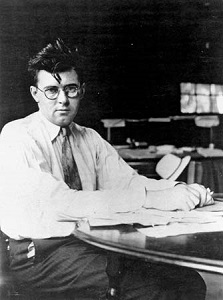
James T. Farrell (27 februari 1904 – 22 augustus 1979)
De Amerikaanse schrijver Irwin Shaw werd geboren op 27 februari 1913 als Irwin Gilbert Shamforoff in New York. Zie alle tags voor Irwin Shaw op dit blog.
Uit: The Girls In Their Summer Dresses
"I'm wonderfully happily married," Michael said patiently. "I am the envy of all men between the ages of fifteen and sixty in the state of New York."
"Stop kidding," Frances said.
"I have a fine home," Michael said. "I got nice books and a phonograph and nice friends. I live in a town I like the way I like and I do the work I like and I live with the woman I like. Whenever something good happens, don't I run to you? When something bad happens, don't I cry on your shoulder?"
"Yes," Frances said. "You look at every woman that passes."
"That's an exaggeration."
"Every woman." Frances took her hand off Michael's arm. "If she's not pretty you turn away fairly quickly. If she's halfway pretty you watch her for about seven steps. . . ."
"My Lord, Frances!"
"If she's pretty you practically break your neck . . ."
"Hey, let's have a drink," Michael said, stopping.
"We just had breakfast."
"Now, listen, darling," Mike said, choosing his words with care, "it's a nice day and we both feel good and there's no reason why we have to break it up. Let's have a nice Sunday."
"I could have a fine Sunday if you didn't look as though you were dying to run after every skirt on Fifth Avenue."
"Let's have a drink," Michael said.
"I don't want a drink."
"What do you want, a fight?"
"No," Frances said, so unhappily that Michael felt terribly sorry for her. "I don't want a fight. I don't know why I started this. All right, let's drop it. Let's have a good time."
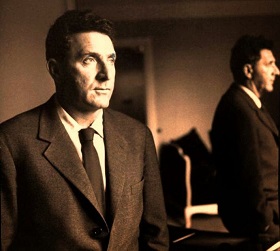
Irwin Shaw (27 februari 1913 – 16 mei 1984)
Zie voor nog meer schrijvers van de 27e februari ook mijn blog van 27 februari 2016 deel 2.
|



